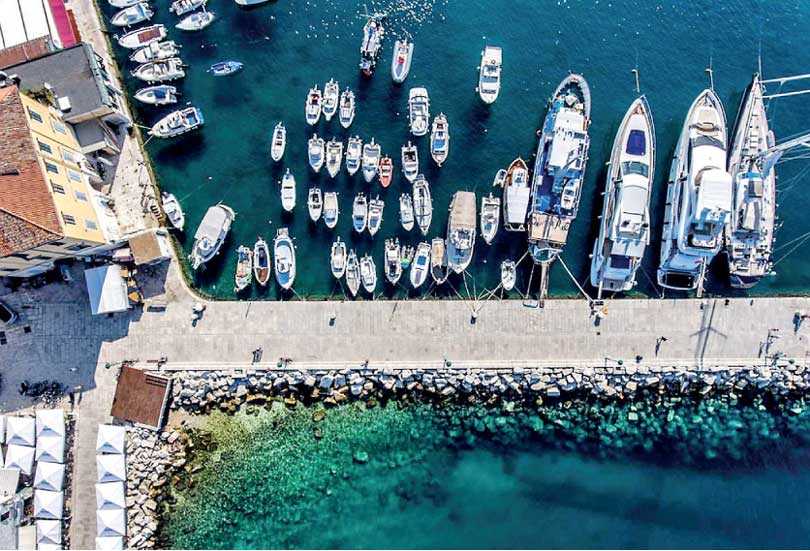Saturday Feb 14, 2026
Saturday Feb 14, 2026
Saturday, 23 January 2021 00:02 - - {{hitsCtrl.values.hits}}

Sri Lanka should prioritise development of nautical tourism. Croatia, with its 600km Mediterranean coast line, harbours 60 marinas with an average of 200 yachts ranging from 10 to 55 metres berthing. The revenue for Croatia from this segment exceeded $ 800 million in 2019
 Considering the high marine diversity and attracting upmarket global travellers, Sri Lanka has great potential for nautical tourism, yacht building, chartering and yacht operation in the region and beyond to be made a prosperous industry.
Considering the high marine diversity and attracting upmarket global travellers, Sri Lanka has great potential for nautical tourism, yacht building, chartering and yacht operation in the region and beyond to be made a prosperous industry.
Nautical tourism is also called water-based tourism combining sailing and boating with holiday and vacation activities. It is travelling by boat or cruise liners/yacht moving from port to port or launching of smaller boats for regattas or day excursions. In Europe, USA and Australia it is a summer activity. Originally defined as an industry segment in Europe and South America it is now very popular in USA, Australia and Pacific.
Many travellers who enjoy sailing combine water travel with other activities. Supplying equipment and accessories for these activities has spawned businesses for these purposes. Many nautical enthusiasts live on board their own vessels in ports/marinas developed for yachts bringing in demand for a virility of goods and services.
There are many marinas built for nautical tourists in Europe, South America and Australia. Tourist services available at close proximity to marinas are leasing of births for yacht / boats. inland travel services such as rent a car/motorcycles/bicycles for inland travel, charter cruises, reception, security services, repair and maintenance, spare part services, diving equipment, water supply, dry rations, vegetables, food and drink, weather forecast, rental of recreational equipment such as jet ski, water scooters.
Sri Lanka
Sri Lanka has seven harbours maintained and operated by ports authority and around 20 fishery harbours. Foreign yachts owned and operated by high spending individuals should be invited to waters of Sri Lanka to anchor. Occupants can be invited to spend a few days in the country as we have attractive on-shore activities such as whale/dolphin watching, scuba diving, leisure fishing, snorkelling, wind surfing and kite surfing.
Kalpitiya is listed as an attractive kite surfing location globally, and many more activities around the country throughout the year. Nautical tourism will contribute to uplift the local yacht and boat building industry to derive indirect export earnings.
Countries in Latin America, Eastern Europe, Singapore, Malaysia and Maldives are now developing this industry as an economic activity for employment creation apart from much-needed foreign exchange earnings. It is important to realise that tourism activity is not isolated or specific, but a conglomerate of many type of activities of public administration, infrastructure, urban development and complementary services.
Nautical tourism must therefore be considered as a high end tourist product, related with entertainment activities in contact with water, where many different nautical activities can take place with an ecological outlook and respect for nature. In addition to being an important complimentary offer for a tourist destination, it is also a well-defined product whose main characteristic is the ocean and inland waterways.
As mentioned nautical tourism can include such activities as recreational boating, marinas, cruises, water sports, water based tourism such as marine wildlife tourism, marine parks, maritime history and education and associated land based components such as hotels/resorts, cafes/restaurants, and ship chandelling. This form of sustainable tourism can create many new employment opportunities as well as bring about a refocusing of existing mature outdated tourism operations. It is also a way to revitalise coastal areas.
A multidisciplinary activity
Tourism and nautical tourism are derived concepts that represent a range of activities susceptible to change. Nautical tourism is a multidisciplinary activity that cannot be unequivocally specified. It will be appropriate to consider that nautical tourism is a poly-functional tourist activity with a strong maritime component.
With 2.3 million arrivals in 2018, tourism was a growing sector in Sri Lanka with a contribution of 5% to GDP. It was the third-highest foreign exchange earner for the country, preceded by workers remittance and textiles and garments. However, this situation of the industry was adversely affected due to two main destructions: Easter Sunday attacks and the worldwide spread of the new coronavirus in December 2019, COVID-19. An important aspect is to envisage the arrivals to grow and to retain its position in the top three exchange earners of the economy.
In this crisis situation, traditional tourism products may not be sufficient to revive the industry and sustain it in the long run, which demands innovations. Even though nautical tourism is not an innovative idea, it is for Sri Lanka since the country does not have any plans for development of nautical tourism. We believe that this is the best time for Sri Lanka to develop a proper strategy to develop nautical tourism as a poly-functional tourist activity with a strong maritime component and an action plan to bring nautical tourism as a very strong contributor to the country’s development. Nautical tourism can be a significant contributor to GDP of Sri Lanka.
Croatia, with its 600km Mediterranean coast line, harbours 60 marinas with an average of 200 yachts ranging from 10 to 55 metres berthing. The revenue for Croatia from this segment exceeded $ 800 million in 2019. Adjoining industries such as boat building yards, dockyards and hospitality sectors, ship chandelling and medical tourism are direct beneficiaries.
It is noteworthy that in Sri Lanka, the boat/yacht building industry has from the beginning demonstrated its ability to obtain foreign export orders, develop designs and build state-of-the art boats that meet international quality and performance standards has high potential for growth.
Proposal for authorities
In order to initiate and progress on the development of nautical tourism, it is important that the country should:
We also urge Government initiation in the areas of:
Policy and regulations governing marina development, infrastructure creation, establishing boat parks
Thanks to our health services and connected authorities Sri Lanka is declared safe for tourism. It’s up to the connected authorities to make capital of this opportunity. We are usually a bottle of gassed water and take action to close the gate after the cows have walked away. SLTDA/UDA, let’s think out of the box.